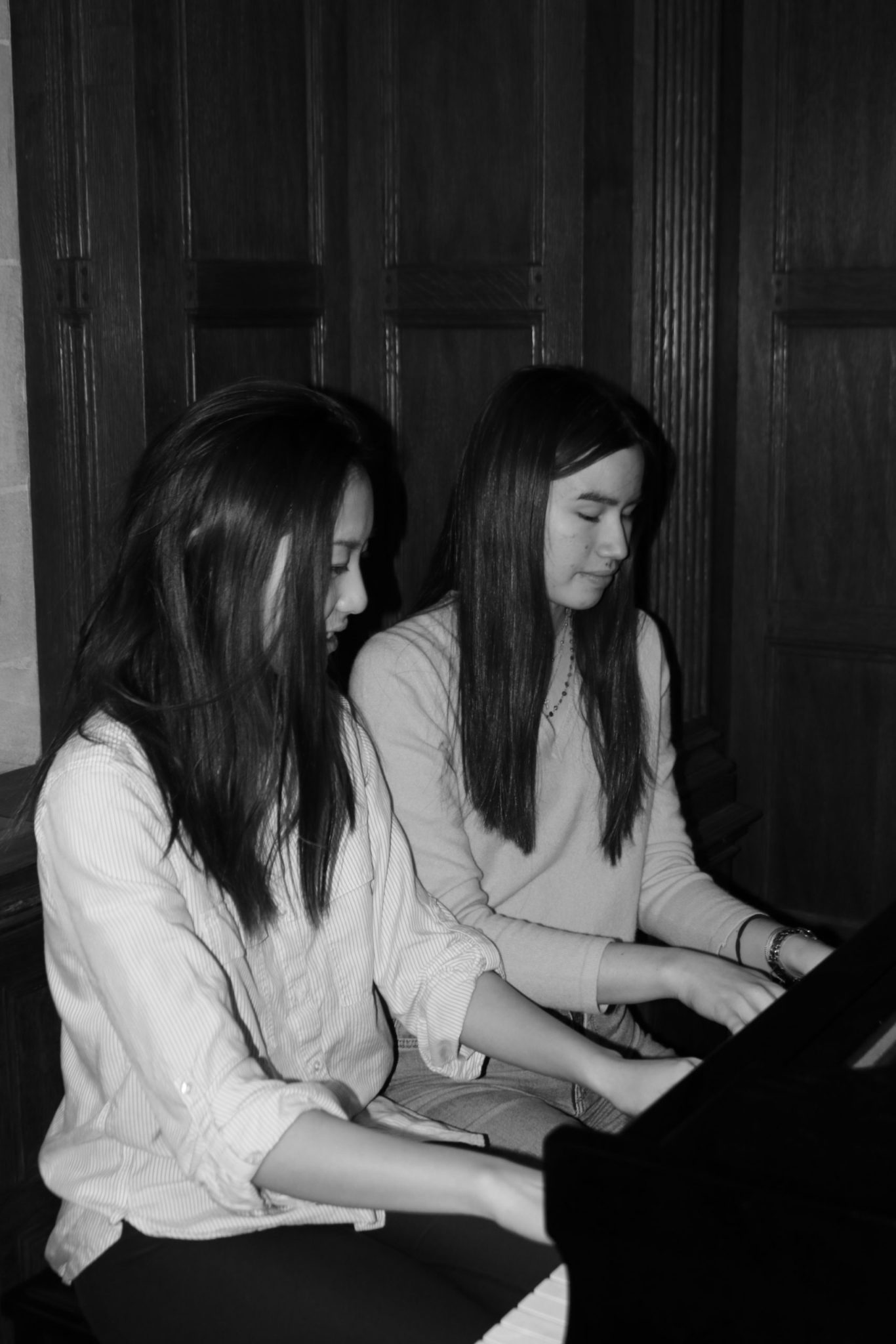“Trick Mirrors”: Trumbull students host experimental joint piano and poetry concert
On Tuesday, Elisabetta Formenton ’25 and Sarah Feng ’25 performed a 45 minute experimental piano and poetry concert where audience members created their own art in conversation with the music and poetry created by the performers.

Courtesy of Sarah Feng and Elisabetta Formenton
Soaring music and melodious spoken words rang out in Sudler Hall Tuesday night as Elisabetta Formenton ’25 and Sarah Feng ’25 presented “Trick Mirrors,” a joint performance combining classical piano and poetry.
After a brief opening speech, Formenton took her seat at a black Steinway piano and began to play. Feng, an opinion columnist for the News, then read aloud original poetry, layering her words over Formenton’s music. The piano program consisted of Frédéric Chopin’s Ballade No. 2 in F Major; Ondine, from Prélude Livre II by Claude Debussy; Chopin’s Scherzo No. 2 in B Flat Minor; and Romance No. 2 in F Sharp Minor, Op. 28 by Robert Schumann. The poetry Feng composed and recited was inspired by Formenton’s musical interpretations of each piano selection.
“Music is a universal language, with its transcendent crescendos accessible to anyone from anywhere in the world, and poetry is a universal music, its rhythm and cadence recognizable even if the words are not,” Formenton and Feng wrote in an email to the News. “We wanted each of our stories to function as a connected crescendo, so we braided them into a connected narrative.”
Formenton and Feng were initially inspired to put on the concert during their first semester at Yale. In the fall, one day they were both sitting in the Trumbull common room waiting for a friend when Formenton began to play the piano and Feng began to write. As they each practiced their preferred artistic instrument, they described it being a “transcendental” experience. Later, in the winter, Formenton and Feng decided to recreate this moment of artistic inspiration. They agreed upon four classical piano pieces that would structure the concert program, and in subsequent weeks, Feng listened to Formenton practice and composed all of her poetry in response to Formenton’s interpretations.
“As she played, it felt like I was brought into a new world — her own world, and I
felt as if I was walking into a world of trick mirrors, a narrative devoid of names and faces but
full of emotions of change, loss and reflection,” Feng said at the concert. “I was brought face-to-face with my own fears and desires, made to confront them in the notes that whirled and drifted, that bled from piece to piece as she played.”
Formenton began to play piano at age seven and became more involved after she entered a music conservatory in middle school. Hailing from Italy, she began an undergraduate degree in piano performance in high school and spent a gap year traveling around Europe performing and meeting with other musicians, including professor Wei-Yi Yang, her current instructor at the School of Music.
Feng began writing creatively when she was eight years old. After working on a novel manuscript in sixth grade, which eventually was published, Feng invested more time into writing in high school. She entered writing competitions and submitted her works to many literary publications. Having won gold for the National Scholastic Art & Writing Award and the Foyle Young Poets of the Year Award, Feng spent a gap year writing another novel and participating in a novel-writing workshop at Stanford.
Throughout the concert, Formenton’s playing and Feng’s words were in conversation with each other: Feng’s writing and performance matched the emotional crescendos and decrescendos of Formenton’s music. Feng’s voice grew in volume and speed as Formenton’s Ballade grew increasingly belligerent, for example. Additionally, Feng repeatedly used the word “iridescent” while Formenton’s fingers glided over the keys playing Debussy.
“Our story weaves together multiple viewpoints throughout time that find themselves parallel reflections of one another,” Formenton and Feng wrote in the program. “As they struggle to survive emotional turmoil and a world collapsing around them, they find refuge in childhood and family, love and loss.”
Formenton and Feng were inspired to extend this artistic conversation to audience members, too. As spectators entered the concert venue, they were given the opportunity to select a sheet of blank paper of a certain size, markers and painting supplies. Audience members were encouraged to create their own art in response to the art being shared on stage. Some wrote poetry of their own, while others painted and sketched while Formenton and Feng performed.
They entitled their concert “Trick Mirrors” to encourage audience members to both appreciate and produce art as a way to take pause and to think about how college both reflects and distorts past and present experiences. Reflection, literal and artistic, was an integral goal and theme of the concert.
“I was just able to hear [Feng’s] words and [Formenton’s] beautiful piano playing and tap into my own vulnerabilities,” Nara Kim ’25 said when describing how this viewing experience was different from other concerts she had previously attended. “I think the theme of trick mirrors really made me reflect a lot. It was a fulfilling experience as I got to think deeply within myself.”
Formenton and Feng received a Trumbull College Creative Performing Arts Award to host this experimental concert. Following the concert, Head of Trumbull College Professor Margaret Clark, who was in attendance, held a post-performance reception at the Head of College house at 241 Elm St.







